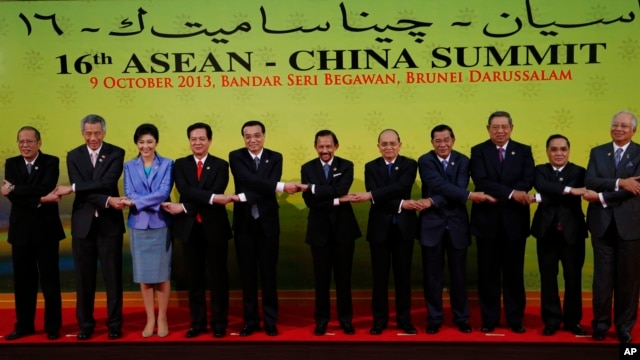
Chinese Premier Li Keqiang, 5th from left, joins hands with the ASEAN leaders for
a group photo before the 16th Association of Southeast Asian Nations (ASEAN) - China
Summit in Bandar Seri Begawan, Brunei, Oct. 9, 2013.
BRUNEI — With U.S. President Barack Obama absent, Chinese leaders have been able to bask in the spotlight at summits this week in Asia. That allowed them to highlight their stances on contentious issues, especially the territorial dispute involving the South China Sea.
Obama had been expected at the summits in Brunei to push for a regional maritime code of conduct that could help avert armed clashes in the disputed waters.
China lays claim to 80 percent of the South China Sea, overlapping those made by several neighboring countries. And its officials this week have expressed no enthusiasm for outsiders applying pressure regarding the disputes.
At the 18-nation East Asia Summit China's premier, Li Keqiang met with other regional heads of government and U.S. Secretary of State John Kerry and called for the talks to focus on areas of cooperation such as economic development and improving people's livelihoods.
Premier Li said East Asia's significant progress in past years has been achieved because the region has been spared military conflicts “which has allowed the countries in this region to keep their focus on development.”
The premier asserted that “freedom of navigation in the South China Sea has never been an issue and will never be one.” He also said China will continue to work for progress in consultations with ASEAN members on a code of conduct in the disputed waters “on the basis of consensus building.”
In other words, China wants to settle the issue country-to-country, not collectively as Washington, Tokyo and some ASEAN members prefer.
An ASEAN-China joint statement issued Thursday revealed no breakthrough. It merely contains a pledge by the regional body and Beijing to “work towards the conclusion of a Code of Conduct in the South China Sea on the basis of consensus.”
Kerry at the East Asia Summit said “a Code of Conduct is a necessity for the long term, but nations can also reduce the risk of miscommunication and miscalculation by taking steps today.” He added that “the rights of all nations, large and small, must be respected.”
Brunei, Taiwan, Malaysia, the Philippines and Vietnam also have claims in the sea conflicting with China's.
The summit's host, the Sultan of Brunei, Hassanal Bolkiah, told reporters at the event's conclusion, there have been “positive developments” recently towards a code of conduct. “ASEAN and China instructed ministers and senior officials to intensify discussions on the proposed CoC [Code of Conduct],” he said.
Shinzo Abe, the prime minister of Japan, which has a separate territorial dispute with China in the East China Sea, told the summit tensions over the South China Sea directly affect regional peace and stability.
The Japanese leader told reporters he would like to see a code of conduct on the South China Sea between ASEAN and China implemented “soon.”
The Philippines government is expressing a similar sentiment.
At the East Asian Summit, U.S. Secretary of State Kerry and Vietnam's foreign minister, Pham Binh Minh, signed a so-called 123 accord. If signed by President Obama and subsequently not blocked by the U.S. Congress, the agreement would allow American atomic energy firms into Vietnam in exchange for Hanoi's pledge not to enrich its own uranium.
A senior U.S. State Department official, speaking on background noted Vietnam "has taken steps towards the development of a robust domestic infrastructure to support its nuclear-power generation program." And that with this agreement "Vietnam has signed on to the strongest global standards of non-proliferation."
Secretary Kerry, minutes after signing the agreement, told Vietnam's prime minister, Nguyen Tan Dung, “it would create numerous opportunities for our businesses between our two countries. And obviously our nuclear cooperation is quite significant.”
Kerry also told the Vietnamese leader that he looked forward to visiting his country “somewhere in the next few months.”
The U.S. Secretary of State made the remark before heading to Malaysia. However, his Friday visit to Manila has been canceled due to the threat posed by a tropical storm approaching the Philippines.
Kerry was dispatched to Asia to stand in for President Obama.
The president pulled out of his trip to the back-to-back regional summits in Indonesia and Brunei, as well as planned visits to Malaysia and Philippines last week because of the U.S. government shutdown.


No comments:
Post a Comment
yes